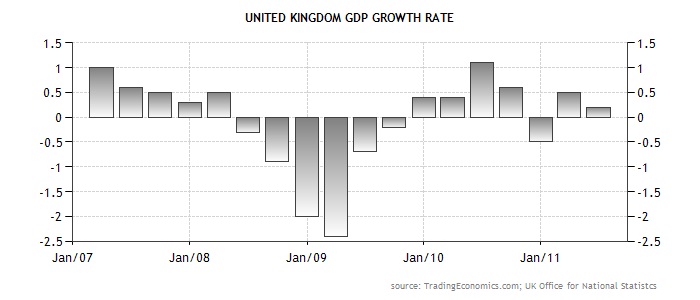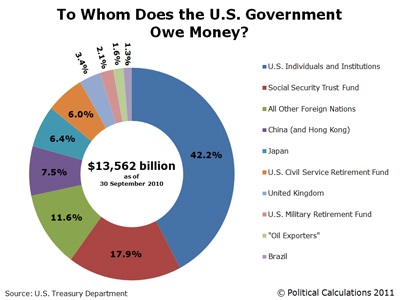
Global headlines continue to churn out news of economic meltdown. With the US debt downgrade and the possibilities of defaults in the Eurozone by countries such as Greece and Spain it appears the economic crisis of 2008 is still with us. The issue of trying to increase economic growth continues to be the main strategy in ending this crisis. Is growth the correct measure for economic success?
What is Growth and how is it Measured?
Growth within a capitalist economy is calculated by measuring the amount that Gross Domestic Product (GDP) has increased over the period of a year with checks done every three months also known as every quarter. The following is a graph showing growth over the last three years as a percentage:

fig 1: Growth over the last 3 years within the UK (http://www.tradingeconomics.com/united-kingdom/gdp-growth)
Is Growth a Good Measure for a Successful Economy?
GDP is a measurement that does capture many positive aspects of the economy. So for example the creation of open source software such as the linux operating system, the creation of the java programming language, a friend that changes a tyre on a car for free, house cleaning done for free, governmental administrative tasks all create value within a society but are not part of GDP.
GDP looks at the value added regardless of the cost to society so for example a natural disaster can destroy towns as was seen with hurricane Katrina. The building work associated with it however was considered a positive addition to GDP. The riots that have happened within London have created much destruction and devastation; the building work associated with this will be considered an addition to GDP. Crime has an industry around it providing individuals with locks, alarms, increased police presence all adds to GDP. The negative effect of alcohol and cigarettes cause a huge burden on the health service and yet the sale of the alcohol and cigarettes and the work created within hospitals as a result of these products all add to GDP.
GDP does not measure wealth distribution accurately. It takes into consideration the total amount earned within society by individuals and companies. Occupations with the highest earnings in 2010 in the UK were 'Health professionals' (median pay of full-time employees of £1,067 a week); followed by 'Corporate managers' (£757); and 'Science and technology professionals' (£704). The lowest paid of all full-time employees were those in 'Sales occupations', at £287 a week according to government national statistics (Office Of National Statistics, 2010). This disparity in wages highlights that the standard of living of people varies significantly. Also the wealth creators within society are top companies within the FTSE 100 (Financial Times Stock Exchange). These include energy companies such as BHP Biliton (mining), Royal Dutch Shell (oil), investment bank HSBC and telecoms provider Vodafone. These top companies are but a few within the UK but add to GDP quite extensively distorting the GDP figure of earnings across all companies.
The Capitalist Economic Model
Interest based debt is a major part of a capitalist economy. In order to make money, money is required. So a property investor would borrow money from a bank in order to facilitate purchasing a house and renovating it in order to sell it and make a profit. As long as the value of the property is greater then the value of the loan the property developer would be in profit after paying off the loan and so the cycle continues. The buying and selling of property by taking loans would mean that the price of the property would always have to be rising in order for the property investor to be able to pay off their loan and make a profit. There would come a time however when the value of a property is too much and cannot be sold, a bubble is created. If too many properties cannot be sold then supply is greater then demand and the property would come down in price until the demand is greater then the supply. This is known as a property price crash, which is what was seen recently in the crisis of 2008. This type of bubble is associated with an economy based on interest based loans as short term profits are required in order to control interest based debt. Short- term profit causes issues with the environment also. The recent growth that has been highlighted in Brazil has been a major factor in the deforestation of the Amazon. Deforestation within Brazil can be attributed to land clearing for pastureland by commercial and speculative interests, misguided government policies, inappropriate World Bank projects, and commercial exploitation of forest resources. All this is linked to short term profits to facilitate interest-based loans and to make greedy men rich.
If we look at such type of thinking at a national level, it can cause widespread misery. A government needs money to run its institutions such as hospitals, schooling, benefits, housing, roads, and infrastructure and so on. In order to pay for all the expenditure, revenues need to be generated. One form of income is taxation. However taxation does not always equal government expenditure and so the government needs other forms of revenue. This second form of income is in most cases borrowing money i.e. debt. This loan is known as a government bond or GILT within the UK or T Bills within the USA and are auctioned by the government. So the government borrows this money in the form of bonds and uses it to pay off its expenditure. As long as its economy is growing more then the repayments of this loan then they can keep borrowing and paying back the loan with the proceeds from taxation. Without growth, these loans cannot be paid off meaning that the government goes into arrears. This is known as the fiscal deficit. If the economy of a government is not growing, then the deficit gets bigger until the government defaults and therefore becomes un-credit worthy. This is a problem because if a government defaults, getting loans becomes difficult as the government are seen as risky to lend to. This means that the government would have to pay a higher level of interest to create demand for their debt. A good example of this is the USA, which has a fiscal debt of 14.46 trillion dollars and a growth rate currently of 1.9%. This debt is growing ever more as it pays governments that hold its debt.

fig 2: Pie chart showing who America owes money to
The USA wants to decrease this deficit by 4 trillion dollar. With a growth that is near non-existent where will this money come from? The answer is taxation and also from an increase in interest rates to reduce inflation and reduction in public spending. But how can a government tax people who don't have money because they don't have a job? And how can they increase interest rates when this will stifle growth and potentially cause another recession?
Decreasing public expenditure is done by reducing the amount of money given to the various governmental departments such as a reduction to the NHS spending, a reduction in council expenditure and so on. A good example of this is a reduction within the UK of up to 50% on young people services. This reduction includes less money for drug education, which has been a major factor to the reduction of drug misuse. Without these type programs the youth will potentially go back to the drugs which will effect the society that they live in whether it be them stealing, mugging or prostituting to serve their drug addiction.
Growth will need to be kick started also so interest rates will need to stay low to encourage borrowing and therefore business growth and therefore economic growth. Low interest rates however leads to inflation and inflation adds insult to injury. So inflation included with no jobs and a country decreasing spending on public services leads to a life standard decrease.
All this happens because of the interest based loans required to pay off public expenditure. If the income of a country is not greater then interest based loan repayments then a country is in trouble. As time progresses expenditure increases meaning that the loans have to increase as well so growth will have to increase to facilitate this. This means that growth needs to be constant. But in a world where resources are finite growth is in fact unsustainable. This means that interest based debt economies are bound to fail and cause issues to the people that live in them. So is there an alternative to this?
Alternative Economy
Islam's economic system does not allow interest on loans and uses the gold and silver standard as an exchange method for services and products. The removal of interest from the economic system and taxation on savings encourages people to keep money in the economy and invested in businesses. Investment within business is done as a partnership where the partners share in profit and loss. The non interest based money lent within a business partnership is positive because
1. The need for short term profits is not required as there is not a big interest based loan to pay off leading to sustainable growth.
2. The economic bubbles that have been created as a result of short-term profits due to interest-based loans will be averted. So the Islamic economic system will remove the economic bubble effect.
3. The partners both have an interest in the business being successful so they will both try and make it work.
Taxation within the Islamic economic system is done on wealth rather than income. This means that individuals will have more disposable income. This disposable income can be spent on luxuries which itself will encourage growth within the luxuries industry.
Financial instruments such as credit debt obligations (CDO), futures, options and the stock exchange system are not permitted. This means that the Islamic economy will not be affected by the dangerous explosive effects these financial instruments.
This is just an aspect of the Islamic economic system and its beauty. This can only be implemented totally within an Islamic caliphate system. Only when this is created will the true might of the Islamic economic system be shown.


